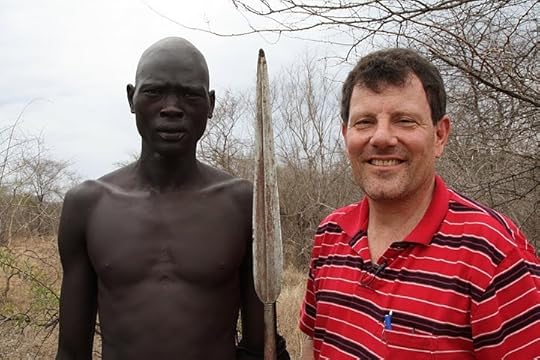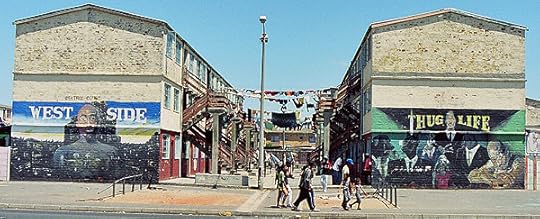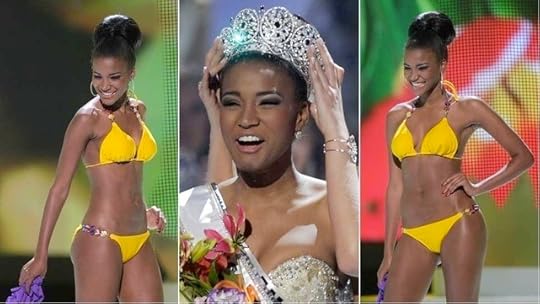Sean Jacobs's Blog, page 616
September 16, 2011
Nicholas Kristoff Saves Another Woman
By Dan Moshenberg
He's ba-a-a-ack! After a decade or so of "saving" South East Asian sex workers from "slavery", sometimes by actually purchasing them, Nicholas Kristoff has found Africa. Kenya, to be specific, and there too, sex workers, or in his words "prostitutes", await.
Kristoff tells the story of Jane Ngoiri, a 38-year-old single mother of two, former slum dweller, now "prostitute-turned-businesswoman." With the help of a group called Jamii Bora, formed initially by 50 "street beggars", Ngoiri developed skills, learned to save, grew.
Then "catastrophe struck". Ngoiri's daughter was in an accident. Medical expenses were crushing. She had to take her son out of school. Fortunately, Kristoff was there! He and his peeps collected money, and without having to resort to "street begging" or "prostitution", and Ngoiri's son is now back in school.
Kristoff's takeaway. Life for the poor in Kenya is terribly "fragile".
But what is Kenya?
From Kristoff's account, it's just another Third World site of pathos, despair, degradation, and fallen women waiting to be saved.
Kristoff's article couldn't come at a more ironic moment. In Kenya, this past week has been described as "a week of tears." A pipeline exploded, killing scores. It turns out, experts had warned about this very possibility. And who dies, or better who is killed? The poor. And who is culpable? The oil and gas companies and the State that conspire to not care about safety precautions. And so now, the stories emerge of the tally of the dead, of the tearful reunions of the survivors and their grateful loved ones.
These past couple days in Kenya have seen fires, violence against girls, drought. And more …
Kenyan small hold farmers, for example, are the vanguard of African agricultural development, as they are warriors in the various battles to combat climate change. And who are those small hold farmers? Women. Women like Wayua Mwanza, 36-years-old, and a mother of three. Kenyan women farmers teaching and learning from … Kenyan women farmers!
As Somali women refugees move into Kenya, and in particular Dadaab, reputed by some to be the largest refugee camp or settlement in the world, many of them encounter antenatal clinics for the first time. That antenatal treatment is provided by Kenyan women, in ngo's and in State agencies, as well as by non-Kenyans in various multinational ngo's. Kenyan women teaching and working with … Somali women!
Earlier this week Cecillia Ng'etich, a candidate for public office in the Rift Valley, argued forcefully for women's right to return to school, and for their partners' responsibility to support them in that endeavor.
Life for the working poor, and especially for low- and no-income women, is always fragile … everywhere. And women cannot and are not waiting for some prince in shining white armor to come and rescue them. Women are organizing, at home, in the streets, in the shops, on the farms, in the refugee and IDP camps, in government, everywhere. Tell the story, but tell it right.
* And, yes that is Kristoff with an African tribesman. It's from his own collection.








September 15, 2011
Music Break / Hugh Masekela

I'm going old skool today. In 1984 Hugh Masekela's single "Don't Go Lose It Baby" (off the album "Techno Bush") reached number two for two weeks on the dance charts. I don't think it has anything to do with his football skills (from the 1:36 mark in the music video for the song that looks like it was shot in Botswana).
H/T: Antoinette Engel








Tupac in Africa
This week, fifteen years ago, the rapper Tupac Shakur was gunned down on a Las Vegas street. The combination of his personality–he was a "gifted storyteller", was a explosive personality and an intensity that was unrivaled. As Robert Pierre writes on his blog at The Washington Post: "… Whatever he was doing, he was all in. All in with black nationalism for a while. All in with his love for black women. All in for the West Coast. All in for the Thug Life. All in."
That intensity did not just appeal to just young people here, but also on the continent.
As a 2003 Woodrow Wilson Center report on young people in the developing world, notes:
Tupac Shakur is famous across Africa, most particularly among urban youth. His music is as common in many urban neighborhoods as Bob Marley's once was. His face and poses, pictured on clothing and in murals, are now widely familiar. A popular T-shirt has a black background, showing Tupac (spelled "2Pac") looking alert, with U.S. dollar signs ringing the collar and his most popular slogan, "All Eyez on Me," across the bottom. "All Eyez on Me," indeed—Tupac's lyrics expressing his alienation, fury, and his conviction that his quest for revenge is thoroughly justified, the police sirens in the background of many of his songs, the belief that he was not really murdered but is still alive (often proclaimed in "Tupac Lives" graffiti), all conjure an image of a defiant, proud antihero, and an inspiration for many of Africa's young and alienated urbanites.
In a section on young people and war the report's writers note his impact on youth soldiers in Sierra Leone's late 1990s civil war. There, rebel soldiers adopted Tupac as their "patron saint":
"The rebels wrote Tupac's lyrics on the side of their vehicles" during the Freetown invasion, one Sierra Leonean refugee later recalled. "They wrote 'Death Row,''Missing in Action,' 'Hit them Up,' 'Only God Can Judge,' and 'All Eyez on Me' on them" … the rebels "favored Tupac T-shirts and fancy haircuts".
This was the case in the civil wars in the Democratic Republic of Congo and most recently Cote d'Ivoire. And as Paul Rogers (of LA Weekly) blogs this week, rebels fighting Libyan dictator Muammar Gaddafi now also take inspiration from Tupak Shakur. One young rebel fighter told a British journalist: "I only listen to 2Pac before going to shoot Gaddafi boys."
In Cape Town, where I am from, it is not unusual to find Tupac's face (or that of his last label, Death Row) on wall murals, like the one in the image above: a two-story mural, commissioned by the Hard Livings gang, it is featured prominently on the side of an apartment block in Manenberg, a poor section of Cape Town. And as a 2009 research paper on young awaiting trial prisoners in Cape Town suggest, for many poor young men, Tupac remains the embodiment of manhood. As psychologist Adam Cooper writes in that paper:
Whilst these boys made almost no reference to the history of Apartheid in 25 interviews, the history of Tupac made many appearances:
Roger: "He made history … ja the songs that he sings … killing people … armed robberies … he wasn't scared for the jail. (he could) Get anything … maybe a lot of girlfriends …"
Dewald: "In his songs he just talks the truth, how his life was. He says, I don't know if it's true, he was born in jail … he says that in one song… His mother was pregnant in prison … and he came out in jail. That's why he says the jail is his house."








Safari Suits
Hoping to dress people who want to reference themselves as elites who've had the leisure to "do good" after having spent as much on their wardrobe as they did on their fave charity? Michael Kors did, apparently.
I like Kors' self-parodic performances on the TV show, Project Runway, and also like that he's more into producing for the fashion consumer (albeit the animal-print clad Amazonian variety with the deep pockets); not mystical productions intended to generate critical acclaim (often done without the talent necessary for any real critic to drum up any acclaim).
But this year, for New York Fashion Week, he produced what The Guardian's culture critic and sometime-fashionista Hadley Freeman described as "gap year-esque fare" following the "eternally popular and eternally misguided theme of "safari"," which "looked like something designed solely for a magazine fashion shoot in Africa, probably starring Angelina Jolie lounging decorously on a designer handbag while gazing soulfully at some noble tribesmen."
This serves as an ominous note of reminder to Armani et al, not to pick "Africa" as a theme for their lackluster runway shows. Or to our pal Bono and his spouse, Ali Hewson, who like to get paid for being photographed, gallivanting about on savannas wearing her clothing line, porting "handmade" Vuitton leather goods. Edun, Hewson's "ethical" fashion line, includes a "kikoy" scarf, a "camel print" dress, and a "giraffe print basic tee in dusty brown" - precisely the kind of thing Kors should avoid like hellfire.








September 14, 2011
Music Break / NSZ
Young Mauritians are definitely "Fight[ing] Pu More Freedom."
Organizing through Facebook they've been on the streets 'the last week."








We're suppose to celebrate Miss Universe
Miss Angola, Leila Lopes, was crowned Miss Universe over the weekend. One of the judges, a former American TV newsreader, Connie Chung, told the AP:"… You have to keep in mind that these women are not objects just to be looked at. They're to be taken seriously." Yeh.
Meanwhile, here's what some other young Angolans–who are not competing in beauty competitions–are up to.








If you're not on TV, you don't exist
By Davy Lane
This commercial is currently saturating terrestrial British TV channels. BMW shows off new wheels on sanitized streets of Cape Town. Narrator likes to work hard, play rough. Don't like black coffee. Brother Freddy is a model. He likes it skinny and smooth. They ghost through town without passing by black folks, without getting passed by packed Kombi and manage to park without a Congolese Car Guard. The magic of post modern persuasive media clearances. If you're not on TV, you don't exist.








'The Nigerian Jersey Shore'
Baylor University students (members of the campus African Studies Association) parodies those icons of 21st century Americana, The Jersey Shore. Nails, biceps and blackberries–and egusi soup–for everyone. That said it is 7 minutes too long.








September 13, 2011
The White Man's Burden
September 12, 2011
Youssef Chahine's Cairo
The late, great Egyptian director Youssef Chahine shot this drama/documentary/biography on Cairo for television in 1991. As brilliant and beautiful a depiction of the city as any, Chahine infused the story with his usual political narratives–power, wealth, poverty, racial diversity, corruption and love. It is truly the most fantastic portrayal of Cairo ever produced.
Chahine was also well known for his sense of dark humour. Enjoy, in the first part of the film*, his brainstorming with other filmmakers on what the French must want from a documentary on Cairo.
[image error]








Sean Jacobs's Blog
- Sean Jacobs's profile
- 4 followers















